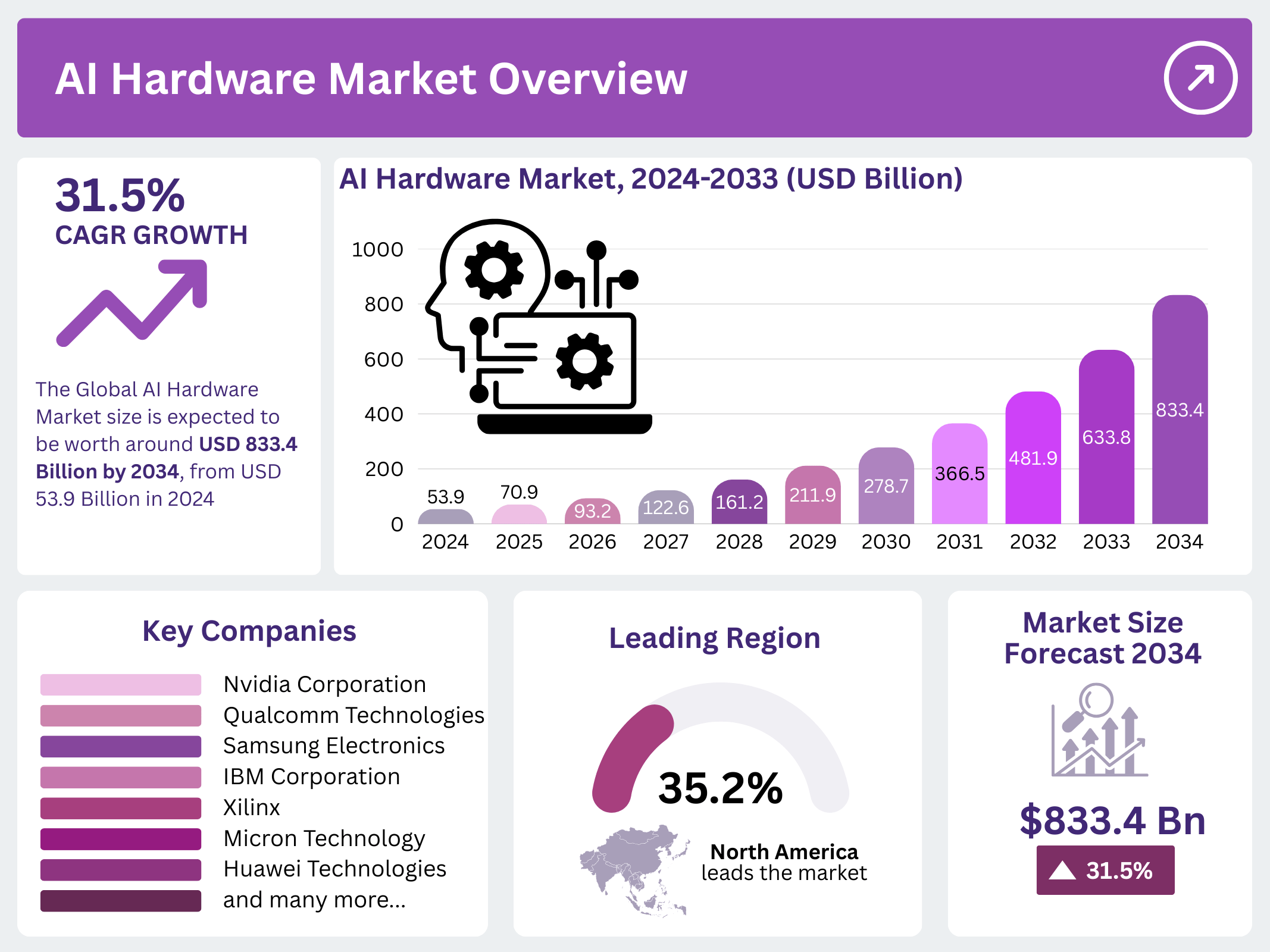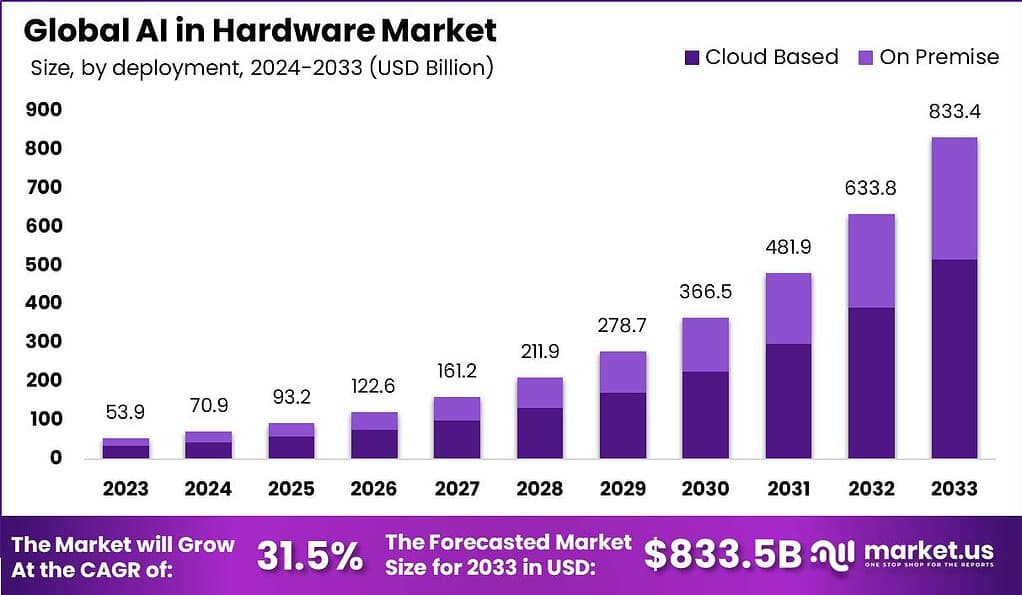
Quick Navigation
Market Overview
The Global AI Hardware Market is projected to experience explosive growth, with the market size expected to reach USD 833.4 billion by 2033, up from USD 53.9 billion in 2023, reflecting a strong CAGR of 31.5% during the forecast period from 2024 to 2033. The demand for advanced AI hardware, including AI chips, processors, and accelerators, is being driven by the increasing adoption of artificial intelligence across industries like healthcare, automotive, and finance. North America dominates the market, capturing 35.2% of the share in 2023, generating USD 18.9 billion in revenue, largely due to the region’s strong technological infrastructure and high investments in AI research.

Key Takeaways
-
The AI Hardware Market is expected to grow at a CAGR of 31.5%, reaching USD 833.4 Billion by 2033.
-
North America holds a dominant market share of 35.2% in 2023, generating USD 18.9 Billion in revenue.
-
AI hardware is a critical component for accelerating AI applications in various industries.
-
Key drivers include the growing demand for AI in edge computing, data centers, autonomous vehicles, and healthcare.
-
The market’s rapid growth is fueled by technological advancements in AI chips and processors, along with widespread adoption of AI-powered solutions.
Smarter strategy starts here! Get the sample @ https://market.us/report/ai-in-hardware-market/free-sample/
Role of AI
AI hardware is the backbone of AI systems, enabling faster and more efficient processing of AI workloads. Specialized AI chips, such as Graphics Processing Units (GPUs), Tensor Processing Units (TPUs), and Application-Specific Integrated Circuits (ASICs), are optimized to handle the complex algorithms and large data sets required by AI applications. AI hardware facilitates real-time processing, faster decision-making, and improved energy efficiency, which is crucial for industries like autonomous vehicles, robotics, and healthcare. As AI continues to evolve, so will the demand for more powerful, energy-efficient, and cost-effective hardware to support AI-driven innovations.
Analyst’s Viewpoint
The AI Hardware Market is positioned for tremendous growth as AI technologies permeate various industries, creating a need for specialized hardware capable of processing increasingly complex tasks. With the rise of edge AI, autonomous systems, and cloud computing, the demand for high-performance hardware is accelerating. North America is expected to maintain its dominant position in the market, but growth is also expected to surge in Europe and the Asia-Pacific regions, driven by digital transformation and government support for AI initiatives. In the coming years, advancements in hardware design and manufacturing will lead to greater performance, lower power consumption, and enhanced scalability.
Regional Highlights
North America continues to lead the AI Hardware Market, capturing more than 35.2% of the market share in 2023, with USD 18.9 billion in revenue. This dominance is driven by substantial investments in AI research and development, along with the presence of leading technology companies. Europe is seeing steady growth, particularly in industries like automotive and manufacturing, where AI hardware is crucial for automation and predictive maintenance. The Asia Pacific region is expected to experience rapid growth, with countries like China, Japan, and South Korea increasing their focus on AI development and the adoption of AI hardware to power advancements in AI-driven applications.
Key Market Segmentation
-
By Type: AI Chips, Processors, Accelerators, GPUs, TPUs – These are critical for running AI models efficiently.
-
By Application: Edge Computing, Cloud Computing, Data Centers, Autonomous Vehicles, Robotics, Healthcare – AI hardware is essential across various sectors for real-time processing and decision-making.
-
By End-User: Automotive, Healthcare, IT & Telecom, Manufacturing, Financial Services – Various industries are driving the demand for AI-powered solutions.
-
By Region: North America, Europe, Asia Pacific, Rest of the World – North America leads, with significant growth expected in Europe and Asia.
Emerging Trends
-
Edge AI Hardware: Growing demand for AI hardware that supports local processing at the edge to reduce latency and increase privacy.
-
AI in Autonomous Vehicles: The adoption of AI hardware to power autonomous driving systems and smart navigation.
-
Quantum Computing Integration: Exploring the role of quantum computing in AI hardware to handle complex machine learning tasks.
-
AI-Powered Robotics: AI hardware designed to power robotic systems for automation in manufacturing, healthcare, and logistics.
-
Energy-Efficient AI Hardware: The focus on developing energy-efficient AI chips and processors to reduce power consumption in AI applications.
Top Use Cases
-
Autonomous Vehicles: AI hardware is key in real-time decision-making for self-driving cars.
-
Healthcare: AI-driven diagnostic tools and wearables rely on advanced hardware to process data and deliver insights.
-
Industrial Automation: AI hardware optimizes manufacturing processes, enabling predictive maintenance and real-time monitoring.
-
Smart Cities: AI hardware supports smart infrastructure, including traffic management, public safety, and energy optimization.
-
Cloud Data Centers: AI hardware accelerates data processing and AI model training in cloud data centers.
Major Challenges
-
High Development Costs: The design and manufacturing of advanced AI hardware are expensive and require significant investment.
-
Power Consumption: As AI applications become more complex, the need for energy-efficient hardware is critical to minimize environmental impact.
-
Supply Chain Constraints: Shortages in semiconductor supply and increased demand for AI chips can disrupt the market.
-
Regulatory Issues: The rapid growth of AI raises questions around data privacy, security, and ethical use of AI technologies.
-
Technological Fragmentation: The lack of universal standards for AI hardware can result in interoperability challenges.
Attractive Opportunities
-
AI for Edge Devices: Developing AI hardware specifically for edge devices to process data locally and reduce dependency on cloud computing.
-
AI in Healthcare: The growing demand for AI solutions in medical diagnostics, personalized medicine, and healthcare robotics presents significant opportunities for AI hardware development.
-
Autonomous Systems: The increasing adoption of AI-powered autonomous vehicles, drones, and robots creates a high demand for specialized AI chips.
-
Smart Home Devices: With the rise of IoT and smart homes, AI hardware is critical for enhancing the functionality and efficiency of connected devices.
-
AI-Powered Cybersecurity: Leveraging AI hardware to enable real-time threat detection and prevention in the cybersecurity space.
Get the full picture—purchase your report today @ https://market.us/purchase-report/?report_id=130423
Business Benefits
AI hardware enables businesses to accelerate digital transformation by enhancing the capabilities of AI-driven systems. By implementing advanced AI chips, processors, and accelerators, businesses can optimize their operations, reduce costs, and increase productivity. AI hardware enables real-time decision-making, which is critical for industries like autonomous vehicles, healthcare, and industrial automation. Additionally, AI hardware enhances machine learning capabilities, improving data analysis and predictive insights. Businesses adopting AI hardware solutions will gain a competitive edge, as they can deliver more efficient and scalable AI-driven solutions to their customers.
Recent Developments
-
Major tech companies are investing heavily in AI chip development for specialized use cases, such as autonomous vehicles and healthcare.
-
AI hardware manufacturers are focusing on energy-efficient chips to reduce operational costs and improve sustainability.
-
The integration of AI hardware with edge computing technologies is becoming more prevalent, enabling real-time processing at the edge.
-
The emergence of AI-powered solutions in industries like robotics, healthcare, and manufacturing is driving demand for high-performance AI hardware.
-
Strategic partnerships between semiconductor companies and AI startups are accelerating innovation in AI hardware development.
Key Players Analysis
Key players in the AI Hardware Market include semiconductor companies, AI hardware developers, and cloud computing firms that focus on designing and manufacturing specialized AI chips and processors. These companies are investing heavily in R&D to develop next-generation AI hardware solutions, aiming to meet the growing demand for AI-powered applications across various industries. Partnerships with cloud service providers and AI software developers are crucial for delivering integrated, high-performance solutions. Additionally, companies are focusing on energy-efficient AI chips to address concerns about power consumption in AI-driven applications.
- Nvidia Corporation
- Qualcomm Technologies
- Samsung Electronics Co. Ltd.
- International Business Machines Corporation (IBM)
- Xilinx Inc.
- Micron Technology Inc.
- Huawei Technologies Co. Ltd.
- Intel Corporation
- Google LLC
- Microsoft Corporation Company Profile
- Advanced Micro Devices Inc.
- Apple Inc. Company Profile
- Dell Technologies Inc.
- Amazon Web Services Inc.
- Hewlett-Packard Enterprise Company
Customer Insights
Customers in the AI hardware market are increasingly looking for solutions that can deliver high performance, energy efficiency, and scalability. Industries like automotive, healthcare, and manufacturing require AI hardware that can handle real-time processing and complex decision-making tasks. Customers are also interested in hardware that supports edge AI capabilities, as it allows for faster processing and greater privacy control. As businesses look to implement AI in their operations, they prioritize hardware that integrates seamlessly with existing systems and offers flexibility to meet evolving needs. Additionally, businesses are seeking AI hardware that enables faster time-to-market for AI-driven solutions.
Future Outlook
The future of the AI Hardware Market looks promising, driven by the increasing demand for AI-powered solutions and advancements in chip technologies. As AI adoption continues to rise across industries, the need for specialized hardware will grow, especially for real-time processing, edge computing, and autonomous systems. The next decade will see continued innovation in AI hardware, with an emphasis on energy efficiency, higher performance, and AI chip customization. As the market expands, new use cases and applications for AI hardware will emerge, further accelerating its growth and transforming industries.
Conclusion
The AI Hardware Market is set to grow exponentially, driven by the increasing demand for advanced processing power to support AI applications across various industries. With the rise of AI in autonomous systems, healthcare, manufacturing, and beyond, the need for high-performance, energy-efficient hardware will continue to surge. North America will remain a dominant force in the market, but significant growth opportunities exist in regions like Europe and Asia-Pacific. As AI hardware continues to evolve, businesses that adopt these solutions will gain a competitive advantage, optimizing operations and enhancing their AI capabilities to stay ahead in a rapidly changing digital landscape.
For additional insights, visit Market.us or follow us on LinkedIn and Facebook.
Contact Us:
Mr. Lawrence John
Global Business Development Manager
Address: Lexington Avenue, Suite 300 New York City, NY 10170, United States
Phone: +1 718 874 1545 (International), +91 78878 22626 (Asia)
Email: [email protected]













